- Home
- Neal Stephenson
The Mongoliad: Book Two Page 37
The Mongoliad: Book Two Read online
Page 37
The first Chinese man, the one concerned about his mission, grunted and spat. “He doesn’t look like much.” He nodded his head toward the camp. “We don’t have time.”
“No, wait,” Lian said, frantically thinking how to convince these Chinese men without revealing too much. “They don’t look like much,” she said hurriedly, adopting a more haughty tone. “These steppe warriors are all barely one bath away from being animals, but this one is...special.”
“We don’t have time for hostages,” the first man repeated.
The man who held her hair wound his hand another revolution, pulling her closely to him. “Go,” he said to his companion. “A hostage could be useful...” He scratched his chin thoughtfully for a moment and then barked a command at his men: “Tie him up.”
“They want to take you—” Lian started to explain to Gansukh in Mongolian, but the Chinese man jerked her head back, and she cried out in pain.
Gansukh surged forward. The Chinese spears came up, and Gansukh stopped just short of the points. One of the soldiers jabbered at him to back away, lightly flicking his spear point at Gansukh’s chest to make his command clear. Glowering at the man who held Lian’s hair, Gansukh took a step back. His hand remained on the hilt of his sword.
“What were you saying to him?” Lian’s captor demanded.
“I was trying to tell him to not fight,” she insisted, trying to lessen the tension on her hair. “He is a proud man. He will not just lay down his sword because you ask him to.”
Another boom of thunder rolled across the camp, and Lian realized the sound was too slight to be real thunder. It was the concussive sound of Chinese explosives, and she swallowed the lump of fear that had risen in her throat. Fire arrows and explosives, she wondered. What sort of attack is this?
The first man made a cutting motion with his hand. “We did not come for hostages,” he said, and he called to the spearmen. Half of the circle surrounding Gansukh pulled back their spears and made to follow their squad commander. “Kill them both” was his final assessment. His men falling in behind him, he ran toward the tents of the Mongol camp.
Lian’s captor hesitated as Gansukh shrewdly eyed the soldiers still holding their spears on him. He remained still, but Lian could read the subtle change in his breathing. He thought they were going to kill him, and he was readying himself.
“Tell him to lie down,” Lian’s captor hissed in her ear. “Tell him to do it quickly, or my men will kill him.” She heard the sound of a knife being drawn from a sheath, and then the cold touch of blade eased against her throat. “And then I’ll kill you.”
She nodded, trying not to pull away from the man or the knife. “Lie down,” she said to Gansukh in Mongolian. “They want to take you prisoner.”
“Why?” he growled. His face was like a mask—only his eyes moved, tracking back and forth between the soldiers threatening him.
“I’m trying to save your life,” she insisted.
He glanced at her, and she flinched at the wounded look in his eyes—the naked accusation of betrayal.
“Please,” she whispered. “Trust me. If you don’t, we’re both dead.
” Gansukh didn’t reply, but his hand moved slowly away from the hilt of his sword. Putting both hands out in front of him, palms forward, he knelt on the ground. One of the soldiers reversed his spear and hit Gansukh in the lower back with the butt of his weapon. He collapsed on the ground, and as a soldier put a knee in his back and grabbed at his hands to bind them, he kept staring at Lian. He didn’t look away as the Chinese men hauled him up and, with a nod from their leader, dragged him into the darkness of the night.
* * *
As soon as the Khagan sat down to eat, Master Chucai made his excuses and left the feast for the solitude of his tent. He had been working nonstop for nearly a week by the time the caravan had left Karakorum, and with the camp established and the Khagan and his entourage seated for the nighttime meal, he was no longer needed. For a few hours, he could meditate or read—he had brought along a new edition of Zhu Xi’s commentary on the Four Books that he had been looking forward to examining for some time. He found, more and more, that it was not sleep that truly recharged his vitality but more spiritual activities. When he lay down at night, parts of his mind churned over the matters of the Empire, and while he found new solutions to problems waiting for him when he awoke, sleep was never particularly restful. Meditation and reflection were his most treasured activities, and there had been a scarcity of both in the last few weeks.
The shouting of the guards stirred him from his meditation, and his eyes snapped open. His ger had been dark but for a single flame in a small brazier and the ambient light from the camp that slipped through the space he had left open at the top of the tent flaps, but there was more light spilling into his ger than he had expected to see. Not sunlight. Firelight.
Master Chucai leaped to his feet and raced to the entrance of the ger. He clawed open the flaps and rushed out. His primary concern was the Khagan’s ger, and he quickly ascertained that it was undamaged and that the figures milling around it were the Imperial Guard. He was too far away to make out individuals among the clustered guards, but he assumed Munokhoi would not tarry long at the Khagan’s ger. He will take the fight to the enemy, Chucai thought as he strode through the maze of tents and wagons. The men guarding the Khagan will be diligent, but they won’t be imaginative.
He had had some reservations about putting the hotheaded jaghun captain in charge of the entire Imperial Guard that was accompanying the caravan to Burqan-qaldun, but Ögedei had ignored his concerns. While he had no doubt Munokhoi would ruthlessly deal with the fools who had mistakenly thought they had stumbled upon a wealthy caravan, it would probably be best to ensure that the Khagan remained safe during the fracas.
Chucai came to a sudden halt. He stared at a nearby tent, watching as a trio of overdressed courtiers struggled to douse the flames slithering across the tent’s roof. Blinking his eyes clear of the dust and ash floating in the air, he slowly turned his head and carefully examined the spread of the fires throughout the camp. An idea swam in the depth of his brain, like an enormous koi in a murky pond, and he tried to remain still so as to not spook it, so that it would come to the surface where he could fully apprehend it. There was a pattern to the fires. They weren’t randomly scattered throughout the camp.
Archers, he noted, firing from an elevated position. He scanned the horizon, trying to spot some sign of where the attack had come from, but the smoke from the fires dirtied the air too much to spot any such sign. This isn’t an accident, he realized, discarding the idea that this attack had been a case of mistaken identity.
Initially, the Khagan had wanted to travel with a smaller entourage—none of his wives, a minimum of supply wagons, and only a single jaghun to protect him. The idea had been ridiculous, and Chucai had dismissed it outright, arguing that the Khagan could travel with no less than a minghan—one thousand men—as his personal security force. And, of course, a thousand men would have required a commensurate increase in supplies, which would have, in turn, increased the amount of time it would take to assemble the caravan. While Chucai thought the desire to travel to Burqan-qaldun was more than a passing fancy on the part of the Khagan, he wasn’t the sort of eager sycophant who would fail to question the ramifications of an idle whim. While the Empire was fairly safe to travel—especially in the heart of territory that had been under Mongol rule for several generations—it didn’t mean that the Khagan’s personal safety wasn’t still of paramount importance. There was always the possibility of attacks by roving bandits—clanless men who would prey on an insufficiently protected caravan or a group of nomadic herders.
But bandits didn’t announce themselves with a volley of flaming arrows. Fire would destroy the very cargo they were hoping to steal.
His own reaction to the attack had been mindless. He had leaped to a conclusion that wasn’t supported by what was actually happening around him. Wasn
’t that one of the very lessons Zhu Xi sought to impart in his commentary? This attack was directed at the Khagan; the raiders knew whose caravan they were attacking. The true question—the one he should have been asking earlier—was why?
Chucai heard a distant crump of noise, and he knew at once that it was the sound of black powder igniting. Grimly, he nodded to himself as he began to walk toward the Khagan’s ger again. He wasn’t hurried. He took his time, his gaze sweeping back and forth across the chaos. His height gave him an advantage; while he couldn’t see over the tents, the scurrying frenzy of panicked courtiers and concubines and shouting soldiers did little to block his field of view. Chucai walked and watched, looking for the real reason the camp had been attacked.
If the goal of the attack was to assassinate the Khagan, then why hadn’t they set fire to the Khagan’s ger? Were their archers that unskilled? Chucai doubted that was true. In which case, the fires were a distraction, a means of splitting the Imperial Guard. But why?
Chucai cut to his right, no longer moving directly toward the Khagan’s ger. Something had caught his eye. He wasn’t sure what he had seen, and it was possible he was chasing a ghost, a writhing smoke shadow cast by firelight.
The koi was surfacing in the pond in his mind.
He caught sight of the movement again, and the feeble phantom coalesced into the dim shapes of three men, dressed in dark clothing, skulking between tents. They carried long sticks—spears, though one was longer than the other two.
“Hai!” Chucai shouted, curious to see if these phantoms would bolt like startled rabbits.
The three men froze, dark blots against the dull leather of a tent. If he hadn’t been staring right at them, he might have not seen them. During the day, they would have stood out quite plainly, but in the night—with the haze of the smoke—they were nearly invisible. Which is exactly what the fires were for, Chucai realized. Cover.
“Hai! Men of the Imperial Guard,” he bellowed, directing his voice toward the Khagan’s ger. “To me! There are assassins among us.”
The men moved, two of them sprinting off between the tents; the other man lowered his spear and charged Chucai, hoping to silence the alarm that had given them away.
Master Chucai had but a moment to ready himself. He had no weapon, and briefly he chided himself again for reacting without thinking, but then the man was upon him, screaming at him in Chinese as he thrust the spear.
Chucai flowed like a wisp of smoke, the thick sleeve of his robe sweeping up and around like a fan. Angling his body so that he became a thin reed, he felt his sleeve tug as the spear pierced the silk fabric. His hand kept moving, inscribing the course a bird makes as it dives down on a lake and scoops up an unwary fish. The bird then rises back into the sky, burdened by what it has clutched in its talons. Chucai brought his hand up and turned, feeling the Chinese man struggle to pull the spear out of his sleeve. He clenched his other hand into a fist.
The spearman looked up, a realization dawning on his face that he had underestimated the length of his opponent’s reach, and then Chucai’s fist smashed into his nose. He cried out and fell back, his hands rising to stem the sudden rush of blood.
Simultaneously with the strike to the man’s face, Chucai had closed his other hand around the shaft of the spear and yanked it free of the man’s grip. Dropping his left hand to the spear, he stepped back, whipping the spear around to catch the man under the left arm. As soon as he felt the spear bite into leather, he pulled it back. The man lowered his arms, staggering from the slice, and Chucai stabbed him in the throat.
The other two had vanished among the tents, but Chucai heard shouts coming from up ahead. His alarm had been heard. Pulling the dead man’s spear free, he ran toward the voices.
Soon enough, he caught up with the Imperial Guard. Several had bows, and their arrows had brought down one of the two skulkers. The surviving one stood near the body of his companion, an arrow jutting out of his leg. He held the approaching Mongols at bay with his long spear, and as Chucai approached, he realized the man was holding the Khagan’s spirit banner. The horsehair tassels were matted with blood and dirt, and the point of the shaft was more ornamental than deadly. What stopped the Mongols from attacking the man was a reluctance to damage the spirit banner.
Chucai hurled the spear he had taken from the Chinese man, and it struck the last Chinese man in the hip with such force that he was knocked off his feet. He landed with a thump, and when he struggled to sit up, he was immediately hit by a handful of arrows.
Chucai barked at the guards and they paused, uncertain as to the cause of his anger. Chucai approached the two Chinese men, and a quick glance verified they were both dead. “Look for others,” he snapped at the guards, shaking his head. “Try to capture one alive.”
Dead men were useless to him.
Chucai picked up the spirit banner and ran his fingers through its tassels, trying to untangle them. What did they want with it? he wondered. Why sacrifice themselves for a piece of wood covered with old horsehair?
He had never held the banner, much less examined it closely. It was just an old stick that Genghis had started tying horsehair to. We are horse people, he had explained to Chucai, and wherever we are, the wind will be with us too. Over time, the Khagan had added more strands to it, and Chucai had always marveled at how this simple thing had become symbolic of the prosperity of the Empire.
When he ran his hands over the banner, he noticed the texture of the wood. It felt both rough and resilient, as if it were an intricately carved piece of freshly harvested wood. He raised the staff, trying to get a better glimpse of its surface in the flickering light from the fires. His thumb encountered a rough spot, and he peered more closely at the bump.
It was a tiny scar, scabbed over with dried resin, not unlike the sort of growth that forms after a sprig has been cut from a living branch.
* * *
In a narrow depression to the east of the Khagan’s great caravan, Lian and her captor reunited with Gansukh and a few other battered Chinese soldiers. Her Chinese captor left her for a moment as he huddled together with the other soldiers, their voices low and clipped. Gansukh lay nearby, on his side, his hands bound tightly behind his back. His face was a mass of shadows and bruises, and to not look at him, Lian turned toward the Khagan’s camp. All that she could see of the great caravan were the lights of the torches and still-burning fires. The sparse grasses of the gentle slope were limned in orange-and-yellow light, like the edge of an enormous and empty stage.
“What is your name?”
Lian turned her head. The Chinese man who had held her hair was done conferring with the others, and they stood nearby, awaiting further instruction. “Lian,” she said. She inclined her head and raised an eyebrow, an imperious look that had worked well on many a sweaty and nervous official. And you are...?
“Luo Xi,” he replied. His lips pulled into a thin smile, fleeting amusement at her airs. Under the dirt and soot, he appeared to have a strong face—handsome, even, in a Southern way that Lian hadn’t seen in years, with strong cheekbones, piercing eyes, and a complexion unmarred by constant exposure to the sun and wind—the opposite of anyone from the steppes. He took off his helmet, revealing a head of thick black hair, and tucked the cap under his arm. He was trying to appear relaxed, but the way his shoulders remained stiff and hunched forward, and the restlessness of his eyes, betrayed his uncertainty.
What was he waiting for?
“I’m from Qingyuan, originally,” said Lian, sensing an opportunity to distract him. “When the Mongols came, they burned the city and took every woman and child as a slave. Many of them”—she swayed slightly, feigning dismay with little effort—“mercifully died soon thereafter. Others...lingered. I was...fortunate. I had useful skills.” She paused, knowing his eyes were on her body. “I had to teach them about Song culture.”
Luo tore his eyes away from Lian’s body and looked over at Gansukh. The captive Mongol had managed to sit up, and
he looked like a hungry wolf that had been caught in a snare. Resentful, tense, and ready for any chance he got. “Did they learn?” Luo snorted.
“I would have made better progress teaching pigs.” She laughed derisively and hoped it didn’t sound forced.
“Pigs are already more civilized than these mongrels.”
Lian turned to the Chinese commander and bowed from the waist. “You have my endless gratitude for rescuing me.”
Luo acknowledged the bow with a nod and a slight, formal smile. “A lady in distress is always worth saving.”
“You are far from home, even for the sake of rescuing a lady. Or am I simply an added surprise to your glorious efforts at striking the Khagan down?”
Luo stroked his chin in an effort to hide a secret smile that wanted to spread across his face. “What is the point of killing a single Khan?” he asked. “Will these mongrels not elect another one?”
“Ah, I see you are a clever man, Commander Luo. Your actions are much too sublime and hidden for a simple girl such as myself.”
“And you are much too silver-tongued to be mistaken as such a simpleton, my lady,” Luo replied.
Lian laughed. An unexpected thrill ran through her body, making her shiver. She was very much in danger, as were these Chinese men, and yet the two of them tarried long enough to engage in trivial wordplay. Gansukh would never dream of participating in such an exchange, and it had been so long since she had been around a civilized man that she had forgotten how pleasant such company was. There was a nobility in Luo’s bearing that was unmistakably refreshing.
Luo turned away. He may have sensed the change in their conversation, and unlike Lian, he was not so starved for such talk—or perhaps the reality of their situation pressed more firmly on him than on her. “This filthy mutt,” he said, waving a hand at Gansukh, “he is a special advisor to the Khagan?”
“Indeed,” Lian replied, showing no sign of disappointment, though she felt a tiny panic in her chest. “The Khagan values him highly.”

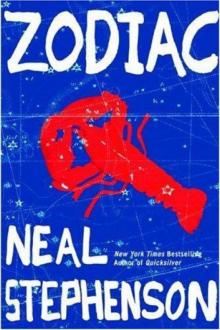 Zodiac: The Eco-Thriller
Zodiac: The Eco-Thriller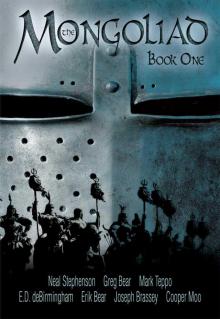 The Mongoliad: Book One
The Mongoliad: Book One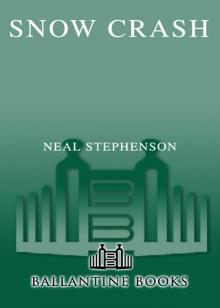 Snow Crash
Snow Crash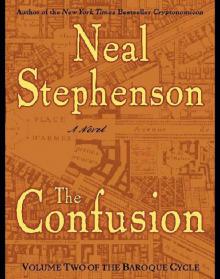 The Confusion: Volume Two of the Baroque Cycle
The Confusion: Volume Two of the Baroque Cycle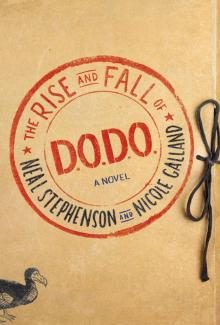 The Rise and Fall of D.O.D.O.
The Rise and Fall of D.O.D.O.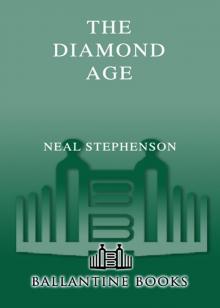 The Diamond Age: Or, a Young Lady's Illustrated Primer
The Diamond Age: Or, a Young Lady's Illustrated Primer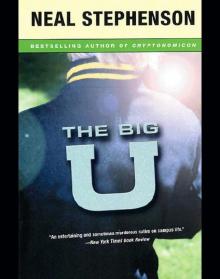 The Big U
The Big U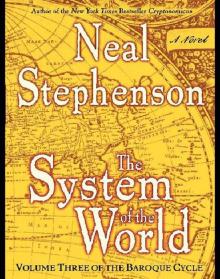 The System of the World: Volume Three of the Baroque Cycle
The System of the World: Volume Three of the Baroque Cycle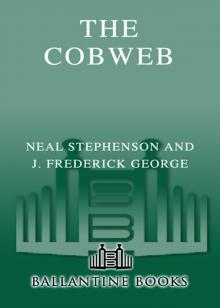 The Cobweb
The Cobweb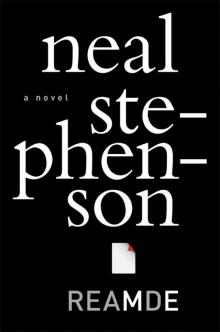 Reamde
Reamde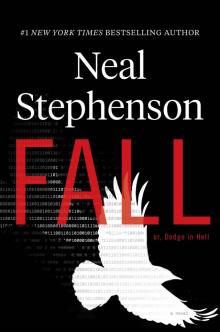 Fall; or, Dodge in Hell
Fall; or, Dodge in Hell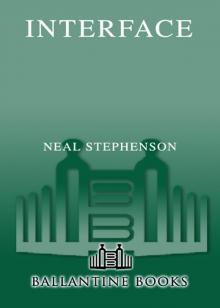 Interface
Interface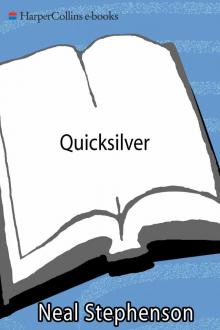 Quicksilver
Quicksilver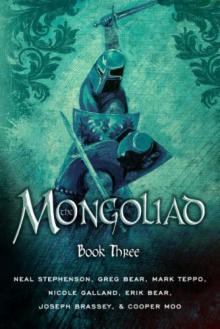 The Mongoliad: Book Three
The Mongoliad: Book Three Seveneves
Seveneves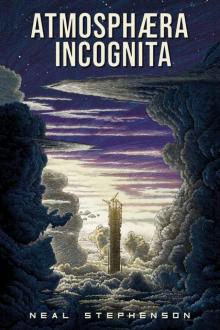 Atmosphæra Incognita
Atmosphæra Incognita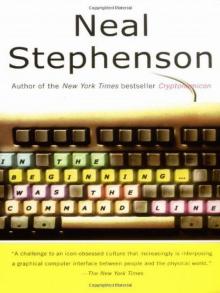 In the Beginning...Was the Command Line
In the Beginning...Was the Command Line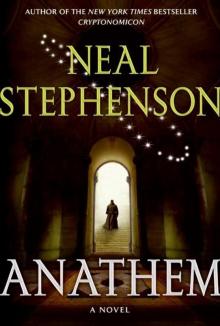 Anathem
Anathem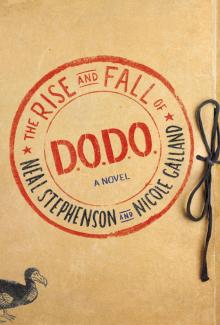 The Rise and Fall of D.O.D.O.: A Novel
The Rise and Fall of D.O.D.O.: A Novel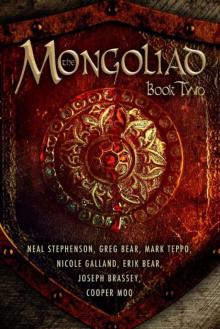 The Mongoliad: Book Two
The Mongoliad: Book Two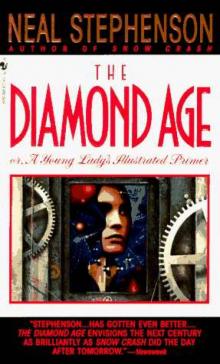 Diamond Age or a Young Lady's Illustrated Primer
Diamond Age or a Young Lady's Illustrated Primer THE System OF THE WORLD
THE System OF THE WORLD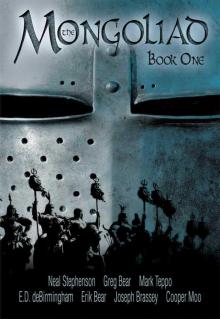 The Mongoliad: Book One tfs-1
The Mongoliad: Book One tfs-1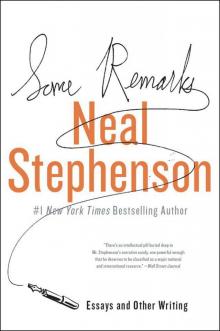 Some Remarks: Essays and Other Writing
Some Remarks: Essays and Other Writing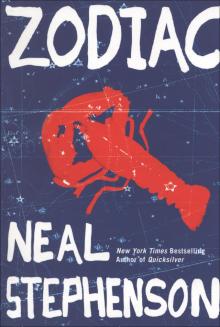 Zodiac
Zodiac Spew
Spew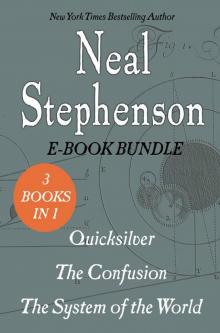 The Baroque Cycle: Quicksilver, the Confusion, and the System of the World
The Baroque Cycle: Quicksilver, the Confusion, and the System of the World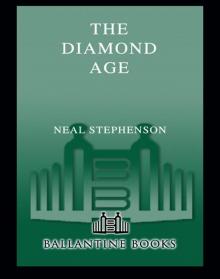 The Diamond Age
The Diamond Age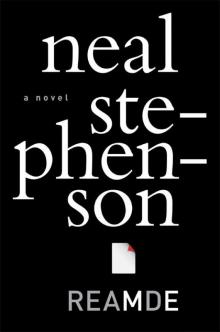 Reamde: A Novel
Reamde: A Novel In the Kingdom of Mao Bell
In the Kingdom of Mao Bell Mother Earth Mother Board
Mother Earth Mother Board Twelve Tomorrows - Visionary stories of the near future inspired by today's technologies
Twelve Tomorrows - Visionary stories of the near future inspired by today's technologies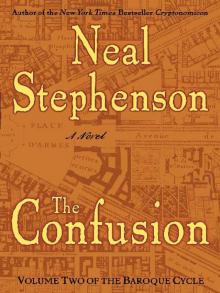 The Confusion
The Confusion The Great Simoleon Caper
The Great Simoleon Caper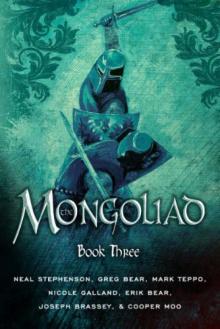 The Mongoliad: Book Three tfs-3
The Mongoliad: Book Three tfs-3